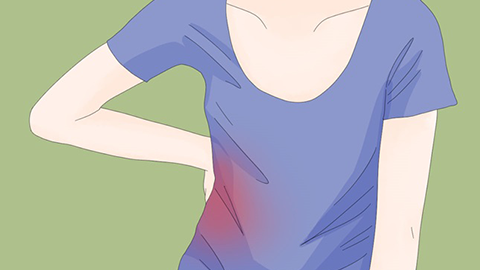What causes lower back soreness and pain after childbirth?
Lower back soreness and pain after childbirth may be caused by uterine contraction and recovery, postpartum fatigue, lumbar muscle strain, lumbar disc herniation, pelvic inflammatory disease, and other conditions. Symptoms can be improved through rest, physical relief methods, and medication. If the pain continuously worsens or is accompanied by leg numbness or fever, prompt medical attention is necessary.
1. Uterine Contraction and Recovery: After childbirth, uterine contractions that return the uterus to its normal size may pull on surrounding ligaments and stimulate nerves in the lower back and sacral area, causing soreness and discomfort, which may intensify during breastfeeding. It is recommended to rest in bed and avoid prolonged standing. Lying on your side can reduce pressure on the lower back, and gentle massage of the lower back and sacral region may help relieve discomfort.
2. Postpartum Fatigue: Getting out of bed too early after delivery or improper posture when holding a baby can place continuous strain on the lower back muscles, leading to soreness and pain. It is advisable to minimize bending activities, use a lumbar pillow for support when holding the baby, avoid maintaining the same posture for long periods, and rest promptly when feeling tired.

3. Lumbar Muscle Strain: Weakened back muscle strength after childbirth, combined with repeated strain or exposure to cold, may lead to muscle injury, manifesting as lower back soreness and pain that worsens with movement. Under a doctor’s guidance, medications such as ibuprofen sustained-release capsules, Huoxue Zhitong plasters, and eperisone hydrochloride tablets may be used to alleviate symptoms.
4. Lumbar Disc Herniation: Increased spinal load during pregnancy and ligament laxity after delivery may predispose to disc protrusion and nerve compression, resulting in lower back soreness and pain accompanied by leg numbness. Under medical supervision, medications such as mecobalamin tablets, celecoxib capsules, and mannitol injection may be used to manage symptoms.
5. Pelvic Inflammatory Disease: Bacterial infection after childbirth may cause pelvic inflammation, with pelvic congestion stimulating surrounding tissues and leading to lower back soreness, a sensation of heaviness in the lower abdomen, and abnormal lochia. Follow medical advice to use medications such as cefixime dispersible tablets, metronidazole tablets, and Fuyankang capsules to improve symptoms.
Maintain warmth in the lower back to prevent chilling, choose a mattress with moderate firmness, consume a diet rich in calcium and protein, perform gentle lower back stretches appropriately, and avoid overexertion to support recovery of lumbar function.




